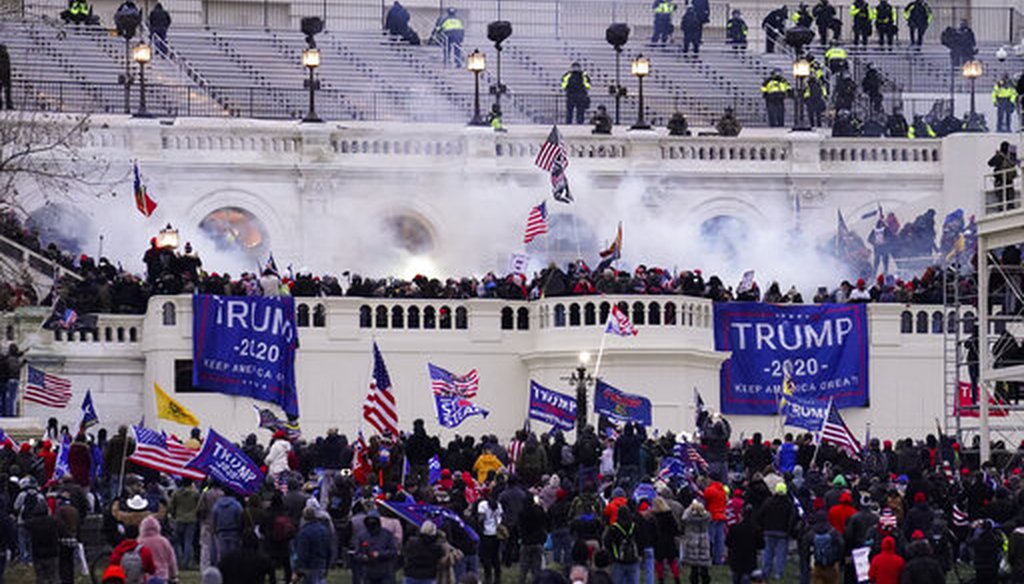Stand up for the facts!
Our only agenda is to publish the truth so you can be an informed participant in democracy.
We need your help.
I would like to contribute

Violent protesters, loyal to President Donald Trump, storm the Capitol on Jan. 6, 2021. (AP)
What happened at the U.S. Capitol on Jan. 6 has been described variously as an insurrection, a coup and domestic terrorism — but whatever you call it, it was a significant historical event. And as the nation nears their six-month anniversary, there is little agreement on a roadmap for how to investigate events that threatened to stop the certification of the 2020 election.
A proposal for a blue-ribbon bipartisan commission appears to be shelved, after too few Senate Republicans supported its creation. It’s unclear what might come next.
But there are still some options for a more thorough look at what happened.
A task force — perhaps run by the Justice Department or a mix of agencies — could be created to propose new policies, experts told PolitiFact. Alternately, or in conjunction, the Justice Department could convene a grand jury and appoint a special prosecutor.
Congress itself could continue to investigate. But such investigations offer mixed prospects for a thorough, credible investigation, largely due to partisanship in Congress, both real and perceived.
Sign up for PolitiFact texts
Having Congress investigate itself is "suboptimal to having some sort of independent commission," Molly E. Reynolds, a congressional scholar at the Brookings Institution, said during a May 20 podcast. "Some of what happened on Jan. 6 ... is going to require asking hard questions about the U.S. Congress itself and about how its bureaucracy is organized. ... Congress, I think, really could use some outside fact-finding in this case."
A recent probe by two Senate committees, Homeland Security and Rules and Administration, spotlighted both the benefits and the limits of congressional investigations into Jan. 6. Its jointly released 127-page report demonstrated that lawmakers, working across party lines, could produce a document that is taken seriously and is able to provide recommendations for improvement.
But at the same time, the Senate report, released June 8, showed that individual congressional committees are hemmed in by the limitations of their jurisdiction, leaving gaps in what they can investigate. The joint Senate report focused on the committees’ specific areas of oversight, such as the Capitol Police and the broader law enforcement response to the breaching of the Capitol.
It was also limited to the constraints of bipartisan agreement. Perhaps most notably, the joint report did not delve into what role President Donald Trump had in inspiring the events of Jan. 6, or the mindset of those who breached the Capitol.
"There’s plenty more work to be done, and the more folks that are engaged in it, the better," Sen. Gary Peters, D-Mich., who was one of the four Senate chairmen leading the joint inquiry, told the New York Times. "They’re going to have more time and staff resources, and a commitment to do a real deep dive."
A blue-ribbon commission would have been able to overcome these shortcomings. Modeled after the independent bipartisan commission that studied the 9/11 attacks, members of a commission would not have included sitting members of Congress or other current federal officials. The idea was to remove the investigation from the political currents of the day, making it possible for panel members and staff to explore touchier subjects.
Here, we’ll take a closer look at the pluses and minuses of congressional investigations as a Plan B for a bipartisan commission.
The joint investigation by the Homeland Security and Rules and Administration committees was based on three months of hearings, interviews and document reviews. It was led by the top Democrats and Republicans on each committee: Democrats Peters and Amy Klobuchar of Minnesota, and Republicans Rob Portman of Ohio and Roy Blunt of Missouri.
The report included 20 recommendations, mostly focusing on issues like Capitol Police training and equipment, how the Capitol Police handled intelligence, and how well or poorly the chain of command operated.
The committees’ rules focused the investigation on the Capitol Police and the specific events of that day. Meanwhile, the desire to produce a single report without being undercut by a dissenting minority report made it difficult to include much discussion of Trump’s role in the lead-up to Jan. 6.
Another shortcoming was that the joint committee was unable to secure full cooperation from the FBI, the Department of Homeland Security, and the Justice Department. The report did not provide details on why the departments did not fully cooperate.
Matt Glassman, a senior fellow at Georgetown University's Government Affairs Institute, said that the committees’ report adds value, but is incomplete.
"It's a public compilation of the bureaucratic deficiencies in the response," Glassman said, "and it will help spur improvements in security processes at the Capitol and across the various agencies, legislative and the executive branch."
At the same time, Glassman said, "it does not address the most divisive political issues: the role of the political leadership of the administration, including the president, in both the lead-up to the insurrection, and in the response to it. Perhaps more importantly, the lack of information the committees got from the Department of Homeland Security and the Justice Department prevent a full accounting and analysis of the events and the response."
The committees’ inability to secure agency cooperation also stood out to Mark Osler, a law professor at the University of St. Thomas. "The failure of the Justice Department to cooperate with investigators is particularly problematic, and a higher-profile investigation would be better able to address that," he said.
One of the report’s most striking omissions was the avoidance of the word "insurrection" to describe the events of that day. The Washington Post’s Aaron Blake noted that "the word appeared 11 times in the report, but only when directly quoting someone or citing a report that used it."
While New York University law professor Ryan Goodman said it’s helpful that the report’s findings and recommendations "have not been immediately undermined by partisan rancor and carry with them the force of bipartisan agreement," what was excluded shows the drawbacks of that approach. "That’s a failure for public education and for the historical record," Goodman said.
The report also offered little discussion of what Trump was doing or saying that day. Nor does it say much about the motivations of those who stormed the Capitol.
"The report gets at security lapses, but has little to say about why this attack happened, who is responsible, and how we must dismantle the leadership to prevent a reoccurrence," said James Robenalt, an attorney with experience studying political investigations. "We know little about what President Trump was doing during the attack and his communications. Nor do we know much about who supported the attack or assisted in planning."
A more complete investigation would include subjects beyond the jurisdictional scope of one or two standing congressional committees, experts said.
"A full investigation would explore the role of social media companies in spreading disinformation about the election and helping mobilize violent extremists, the underlying sociopolitical causes that influenced Americans to engage in political violence, the role of the White House in its failed response to the assault, and what President Trump and his close associates knew in advance of that day," Goodman said.
If there’s a consensus among experts for a Plan B, it’s probably a new, select committee of members of Congress with the specific job of investigating Jan. 6. Select committees are established by a formal resolution with specific tasks and jurisdictions, and the members are chosen by both party leaders.
House Speaker Nancy Pelosi, D-Calif., told CNN's "State of the Union" on June 13 that a appointing a select committee was "an option" if the Senate can't secure three more votes for a bipartisan commission.
On the upside, however, a select committee would have a broader purview than existing committees, because its jurisdiction would be spelled out in the resolution to create it. A select committee would likely garner more public attention than multiple niche investigations by standing committees.
Finally, depending on how a select committee’s rules are written, it could be granted stronger subpoena powers than the joint Senate committee investigation had — powers that might not be dependent on agreement by the chamber’s minority. This would be something of a double edged sword: The committee might produce harder-hitting findings, but at the cost of less bipartisan buy-in.
Despite its flaws, experts we spoke to said that a select committee would be the best alternative as long as a bipartisan commission remains out of reach.
"Watergate was investigated by multiple congressional committees and the FBI before the Senate Select Committee began," said Robenalt, a scholar of President Richard Nixon’s Watergate scandal. "Those earlier efforts failed to uncover the full facts and were practically invisible to the public."
Glassman agreed. "Absent an independent commission, I think a select committee is the best way to go," he said. "I'm in favor of a full legislative branch accounting of what happened. I don't think executive branch investigations are enough. I think it'd be pretty embarrassing to not have any significant institutional response to the Jan. 6 riot."
Our Sources
Senate Homeland Security and Governmental Affairs Committee and Senate Rules and Administration Committee, joint report, June 8, 2021
New York Times, "Senate Report Details Security Failures in Jan. 6 Capitol Riot," June 8, 2021
New York Times, "Why the Capitol Riot Inquiries Leave Room for a Broader Commission," May 25, 2021
Washington Post, "Don’t call it an ‘insurrection’: GOP moves to excise a word it once used for Jan. 6," June 8, 2021
CNN, "Senate report reveals new details about security failures ahead of January 6 attack but omits Trump's role," June 8, 2021
Austin Evers, "The Next Best Option if a January 6 Commission Fails," May 24, 2021
Brookings Institution, "Why does Congress need an independent 1/6 commission?" May 20, 2021
PolitiFact, "What is the scope of the proposed Jan. 6 commission? And is there a Plan B?" May 21, 2021
Email interview with James D. Robenalt, attorney with the firm Thompson Hine LLP, June 10, 2021
Email interview with Mark Osler, law professor at the University of St. Thomas, June 10, 2021
Email interview with Andrew M. Wright, partner at the law firm K&L Gates, June 10, 2021
Email interview with Michael J. Gerhardt, law professor at the University of North Carolina-Chapel Hill, June 10, 2021
Email interview with Ryan Goodman, New York University law professor, June 10, 2021
Email interview with Matt Glassman, senior fellow at Georgetown University's Government Affairs Institute, June 10, 2021








































